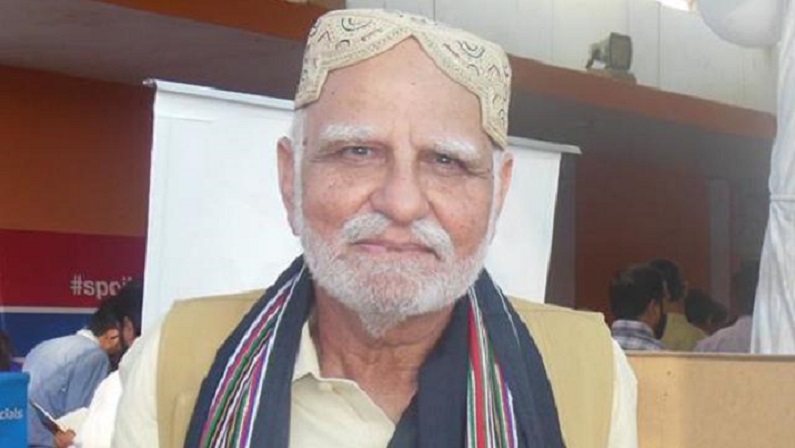Mir Mohammad Ali Talpur belongs to Talpur tribe, the most famous and influential Baloch tribe in Sindh. The Talpur tribe ruled Sindh from 1783 to February 17, 1843. British conquered the region on February 17, 1843 after the “Battle of Miani” a fierce battle between forces of the Bombay Army of British East India company, under Charles Napier and the Baloch Army of Talpur Amirs of Sindh that was led by Mir Nasir Khan Talpur.
Late Mir Ali Ahmed Talpur, the father of Mir Mohammad Ali Talpur and late Mir Rasool Bakhsh Talpur, uncle of Mir Mohammad Ali Talpur were influential politicians. Both brothers were known as Baloch nationalists, humble human beings, honest and influential politicians. Mir Mohammad Ali Talpur joined the Baloch freedom struggle in his youth. He joined Baloch national struggle for freedom in the 1970’s. He, along with other Baloch freedom fighters and people, migrated to Afghanistan and remained there until the fall of Dr Najeebullah’s regime. Mir Mohammad Ali Talpur saheb is widely respected by Baloch pro-independence nationalists as a committed comrade to the Baloch cause.
Dosten Baloch: We keep hearing news about “missing persons” of Balochistan. Why do people disappear or go “missing” in Balochistan?
Mir Mohammad Ali Talpur: The ‘Missing Persons’ issue in Balochistan is not a new one and it has been used as State policy there since 1973 to suppress the Baloch demand for their inalienable rights and their opposition to exploitation of resources of Balochistan. This crime against humanity has been employed by states in Latin America, Asia and even in Europe to suppress dissent but has failed to achieve their aims as people of Balochistan continue to resist despite threat to their lives.
Dosten Baloch: How do you see the ongoing Baloch struggle for freedom and its impact on regional relations?
Mir Mohammad Ali Talpur: Balochistan is not only geo-strategically important but is also has abundance and surfeit of resources which not only the regional powers but all would like a share in. So, anything that Baloch do for their rights is going to have an effect on all interested in Balochistan for one reason or the other. Some like China eye the resources and its strategic position for its own benefit so naturally it is actively working against Baloch struggle while those that oppose China’s plan think otherwise but because they oppose China’s plans this doesn’t make them friends of Baloch just because they oppose China not because of sympathy for Baloch but because of their own interests.
Baloch struggle has to be independent and self-sufficient to maintain its effectiveness and dignity.
Dosten Baloch: What are the possible factors behind Pakistan’s recent military escalation in occupied Balochistan?
Mir Mohammad Ali Talpur:One doesn’t need to be a rocket scientist to understand why there is escalation of military activities in Balochistan. The resistance to the exploitation has stiffened and China wants immediate returns for its investments so all is being done to quell the resistance to the economic and political exploitation in Balochistan. The escalation will always be in proportion to the resistance.
Dosten Baloch: How is the CPEC (China-Pakistan Economic Corridor) affecting lives of people across Pakistan and in Balochistan?
Mir Mohammad Ali Talpur:The CPEC is a colonial venture and it will not in any way better lives of people in Balochistan and even in Pakistan a limited elite will reap benefits along with the military.
Dosten Baloch: Why are the Pashtuns so restless in Waziristan? What role could the Pashtun Tahafuz Movement (PTM) play in Pakistan and in South Asia in the near future?
Mir Mohammad Ali Talpur: For decades injustices have been perpetrated against Pashtuns under the guise of ‘war on terror’ and the PTM is a natural reaction to these injustices. What impact the PTM will have in the political scenario here and the region depends on persistence of the resistance to the injustices there. A resistance which challenges injustices can only have a positive political impact on the place where it is being waged and resistance has a natural spill-over effect in the region.
Dosten Baloch: In the wake of recent developments in Afghanistan (US-Taliban peace deal, terrorist attacks and Afghan government formation) do you think that there will be a fresh round of volatility across South Asia in the near future?
Mir Mohammad Ali Talpur: The Afghan peace has to come from efforts of Afghans and not from a tired and unsuccessful America which is anxious to run away from the mess it is responsible for since 1978. If the Taliban are allowed to gain control the consequences will not be different from their first round of rule. Peace in Afghanistan will only come when external interference there is completely stopped.
Dosten Baloch: How will the Coronavirus pandemic affect South Asian politics in the coming months?
Mir Mohammad Ali Talpur: The Coronavirus pandemic is not only going to change the South Asia it is going to change the world. Expecting changes in South Asia in the political context is expecting too much as the entrenched establishments here have no concern about the lives of people but are interested in confrontation. I do not see much of a change, of course, unless people put an end to these self-serving establishments but seemingly this is to remain a dream.
Dosten Baloch: How will the US-China tussle and US-Iran tussle affect Pakistan and the South Asian region?
Mir Mohammad Ali Talpur: When the elephants fight the grass gets trampled. The tussle between various powers will surely adversely effect Pakistan and South Asia because the countries of this region willingly become proxies as they have little or no concern for the welfare and well being of the ordinary people. The ordinary people are the grass here and it is they who will be trampled.
(This interview was first published in Sangar Media Group and is being re-published in News Intervention after due permissions)

